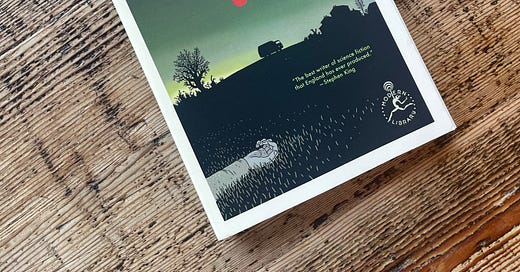How to Survive an Apocalypse (Should You Ever Need To)
Bonus Classic Novel Review: ‘The Day of the Triffids’ by John Wyndham
Finding yourself in a post-apocalyptic world, do you (a) avoid the dangerous monsters on the prowl, (b) avoid any fellow humans suddenly behaving like monsters, or (c) look for love? If you answered (d) all of the above, you’re correct!
But, then, you’ve probably read this story before, even if you’ve never heard of John Wyndham’s The Day of the Triffids. The 1951 thriller set the template for pretty much every other post-apocalyptic novel or movie to follow: Disaster strikes, the world falls apart, and a select few rally and rebuild despite overwhelming odds.

In Wyndham’s Ur-version, a strange plant is mysteriously bioengineered and by accident—or malice—spreads across the globe. These new weeds grow taller than a man, have a wicked stinger that can paralyze and kill, and also manage to walk on three root-like feet, hence their name: triffids.
Humans quickly manage to strike an ecological balance with these slow-moving monsters, raising and harvesting them for industrial oil, corralling them in parks, and even keeping them—once pruned of their stingers—as novelties. Families feature ornamental triffids in their flowerbeds and along the hedgerows. What could go wrong?
I’ll tell you: One night the sky fills with light, supposedly from a fragmenting comet, scattering dazzling, illumined debris in the upper atmosphere. The narrator and protagonist Bill Masen disputes this, but whatever the exact cause the effect is immediate. Anyone caught looking at the radiant display—the majority of earth’s population—goes blind shortly thereafter.
Masen, holed up in a London hospital and unable to see, retains his sight. His eyes, though nearly healed, had been bandaged during the catastrophic light show. Suddenly he finds himself among the minority of sighted people in the world. Meanwhile, unable to see, the rest of the planet grinds to a halt.
“Our life had become a complexity of specialists, all attending to their own jobs with more or less efficiency and expecting others to do the same,” says Masen. You pull any piece out of the system and it’s going to buckle—something we all saw with the COVID-era, supply-chain crunch. But what happens when you yank all the pieces at once?
Masen reflects that it’s not man’s smarts that enable him to rule the earth. No,
It is due to the brain’s capacity to make use of the information conveyed to it by a narrow band of visible light rays. His civilization, all that he had achieved or might achieve, hung upon his ability to perceive that range of vibrations from red to violet. Without that, he was lost.
Still trying to ascertain the nature and scope of the catastrophe into which he’s come, Masen takes stock of the situation in and around London. All movement has ceased except random people poking around for food. With a city full of growling bellies, the scramble to survive commences just hours after disaster strikes.
The story splits in two here. There’s the larger, societal narrative of the few sighted people mobilizing to secure the basics for themselves and the blind that stumble into their care: food, shelter, and the rest. This storyline, mostly hinted and allusive, hovers above Masen until he punches into it for the various episodes that constitute the core story.
Masen rescues and pairs up with a sighted woman, Josella Playton, finds safety in one group, only to be separated from both them and Josella and conscripted to find food for the blind. While there he encounters an armed redheaded man who shows no qualms in dispatching a blind man with his revolver. Civilization recedes in more than its technical attainments; moral norms fly out the window as well.
As if this weren’t bad enough, there are those nasty triffids. Sight allowed humans to domesticate the beasts, to corral them, remove their deadly stingers, and more. Deprived of vision, however, humans become lumbering prey for the carnivorous plants. At one moment, Masen and Josella see a group of triffids herding blind humans like sheep.
Now free to roam and reproduce with no human check on their growth, the triffids pose a real threat to humanity—as do other humans. Finally reunited after a period apart, Masen and Josella have a run in with the unscrupulous redheaded man, now part of self-appointed provisional governing body intent on domineering any band of humans in their view.
Throughout the story, different groups of people collect and try to organize settlements or other solutions, mostly unworkable. This is one of the virtues of Wyndham’s novel—indeed, sci-fi more broadly: It dramatizes a series of thought exercises about our present world by imagining radical alterations. How might we react when the pieces on the board are jostled and reset?
It’s a reminder that our social arrangements are historically contingent and far from inevitable—or immune from disruption. At one point Masen reflects,
It must be . . . one of the race’s most persistent and comforting hallucinations to trust that ‘it can’t happen here’—that one’s own little time and place is beyond cataclysms. And now it was happening here.
So, should you need to survive an apocalypse, what do you do? If Wyndham is a trustworthy guide, it comes down to this: keep your head, retain your fundamental scruples, throw in with likeminded people, and avoid the savages, petty tyrants, and poisonous plants. Same as any other Wednesday.
Thanks for reading! If you enjoyed this post, please hit the ❤️ below, punch the restack icon 🔄 and share it with your friends.
Not a subscriber? Take a moment and sign up. It’s free for now, and I’ll send you my top-fifteen quotes about books and reading. Thanks again!
Related posts:







Adding to the reading list!
Solid advice even for non-apocalyptic scenarios: "keep your head, retain your fundamental scruples, throw in with likeminded people, and avoid the savages, petty tyrants, and poisonous plants." Fortunately no poisonous plants around here, but have been following the other suggestions so far :)
This is the second time I have come across this book title this week, and will place it on my reading radar. Thanks for the recommendation!